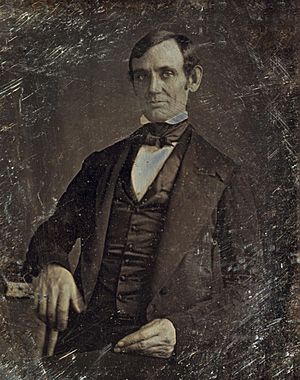Matson Trial facts for kids
The Matson Trial (1847) was a very important court case about slavery in Coles County, Illinois. It was officially called Matson v. Ashmore et al. for the use of Bryant. In this case, a former enslaved man named Anthony Bryant sued for his family's freedom.
What makes this case famous is that Abraham Lincoln defended the slave owner, Robert Matson. This was unusual because Lincoln later became known for ending slavery in the United States. In the trial, Lincoln and another lawyer, Usher F. Linder, were against Orlando B. Ficklin. Ficklin won the case, and Bryant's family became free. This happened because of a rule called the "free soil doctrine." This rule said that if an enslaved person was brought to a free state like Illinois, they could become free.
How It Started
Robert Matson was from Kentucky, where slavery was allowed. In 1836, he bought land in Coles County, Illinois. Illinois was a free state, meaning slavery was against the law. Matson tried to get around this law. He would bring enslaved people to Illinois for about a year, then send them back to Kentucky. After that, he would bring new enslaved people to replace them.
Matson had freed one of his enslaved men, Anthony Bryant. Bryant worked as a foreman for Matson. In 1845, Bryant's family joined him in Coles County. Two years later, in 1847, something happened between Bryant's wife, Jane, and one of Matson's white housekeepers. After this, the housekeeper threatened Bryant's family. Matson then sent one of Bryant's children back to Kentucky.
Anthony Bryant was worried about his family. So, he and his family went to stay with two people who were against slavery. Their names were Hiram Rutherford and Gideon Ashmore. Because the rest of his family was still enslaved, Matson said they were breaking the law about runaway enslaved people. Matson wanted his family back. He asked Usher F. Linder, a former top lawyer for Illinois, to help him. Linder was friends with Abraham Lincoln, who was also a lawyer. Even though Linder was against slavery, he helped Matson. He convinced a local judge to put the Bryant family in jail that fall.
The Trial Begins
The court case, called in re Bryant, started in October 1847. Rutherford and Ashmore, who were helping the Bryant family, wanted Lincoln to be their lawyer. But they found out that Lincoln had already agreed to work with Linder to defend Matson.
Linder then told Lincoln he could switch sides and help the people who were against slavery. But Rutherford said no. Instead, the people helping Bryant asked Orlando B. Ficklin, a former US Representative, to be their lawyer. So, Ficklin was against Linder and Lincoln in the trial.
Lincoln had actually won a similar case before. In 1841, he helped an enslaved woman named Nance and her children become free. In that case, the Illinois Supreme Court said that "every person was free, without regard to race." They also said that "the sale of a free person is illegal."
During the Matson trial, Lincoln agreed that enslaved people became free if they were brought to Illinois to live there permanently. But he argued that Matson only meant to keep the Bryants in Illinois for a short time. He said they were just "passing through." Lincoln also showed evidence that Matson was a good person.
Ficklin argued that anyone who came to a free state like Illinois became free. The judge in Coles County agreed with Ficklin. The judge said that the Bryants had been in Illinois for two years. This was too long to be considered just "passing through." So, the case ended with the Bryants becoming free.
What Happened After
After the trial, Robert Matson left Illinois. He refused to pay his lawyers. The Bryant family later moved to Liberia, a country in Africa.
Some of the arguments Lincoln used in this case were similar to ones used later in the famous Dred Scott v. Sandford Supreme Court decision. The Matson case is still a topic of discussion when people study Lincoln's thoughts on slavery.
Many people wonder why Lincoln defended Matson. Historians have different ideas. Some think he might have believed that a lawyer should help anyone who needs legal help, no matter what. As one historian, Michael Burlingame, said, Lincoln might have thought that a lawyer "who refuses his professional assistance because in his judgment the case is unjust and indefensible, usurps the functions of both judge and jury." This means a lawyer shouldn't decide if someone is guilty or innocent; that's the judge and jury's job.
See also
 | Lonnie Johnson |
 | Granville Woods |
 | Lewis Howard Latimer |
 | James West |


